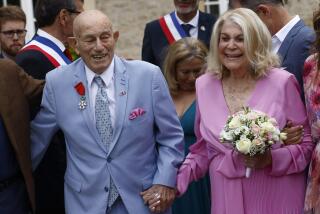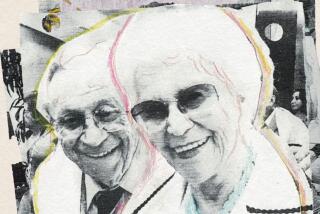More Couples Are Going for the Gold Marking 50 Years of Wedded Bliss : Marriage: Those who gave birth to the baby boom are now celebrating their golden anniversaries. For many, this is a wonderful time of life.
- Share via
BALTIMORE — They’ve been married for 50 years but have known each other for 60. Vivian Batson was a mere 12 the summer Elbert W. Strothers spotted her walking three white spitz dogs on a street in Baltimore. She was stunning. By wending his bicycle around her entourage, he let Vivian know it was love at first sight. Her angry response: “You old bad boy.”
“I just wanted to make an impression,” Strothers says today.
Vivian was still playing with paper dolls and at first showed no interest in her young suitor.
Elbert persisted. “He kept on hanging around until he had to be had,” Vivian Strothers says.
The Strotherses are of the generation who gave birth to the baby boom. They said their vows “for better or for worse” in 1942 when, at the threshold of World War II, patriotism, tradition and family were synonymous and divorce was not yet a popular way out of a problematic marriage.
People “didn’t divorce as much; marriages were very stable,” says Barbara Foley Wilson, a demographer with the National Center for Health Statistics.
By looking at the national marriage rate and other factors, it is safe to assume that golden anniversaries are on the increase, says Sally Clarke, a statistician at the center.
In 1942, there were 1,772,132 marriages. The figure marked a statistically significant leap even in the midst of a steady increase in the marriage rate, Clarke says. In fact, 1942’s marriage rate per 1,000 United States residents ranks as the third highest in this century, behind 1946 and 1947, both post-War banner years for matrimony, Clarke says.
Golden anniversaries may also be on the increase, because decades ago couples married at a young age and had a better chance of surviving 50 years of marriage. Add to that an increased life expectancy delivered by health-care advances and you get the formula for a windfall of 50th anniversaries.
An empathetic social climate also nurtured couples who wed in the 1940s. After the war, soldiers had the “GI Bill advantage. That and good economic times gave them a really good start into the middle class,” Wilson says.
Having children was often an extra incentive for staying together, long-married couples say. And coming of age before the feminist movement reached a critical mass, there was little tug of war between career goals and parenting responsibilities.
Survivors of the Depression, they also learned early how to make hard choices in tough times. Couples who have attained 50 years of marriage speak of the art of “give and take,” and “working together.” As the Strotherses say, marriage “is a creative experience.”
Today, people are marrying at a later age, Clarke says. Because of that trend and a steady national divorce rate close to 50%, the 50-year marriage phenomenon is not likely to flourish forever. Once the high divorce rate “started taking off in the late ‘60s and ‘70s,” the die was cast for a drop in future golden anniversaries, Wilson says.
But for now, there seem to be many couples proud to announce that they have made it. Among them are Elbert and Vivian Strothers, who were wed in 1942, and remain happily married in 1993.
When they were in their teens, Elbert would go to Vivian’s home on Saturdays and scrub floors and perform other household tasks assigned to his girlfriend. “Anything so I could come out to Druid Hill Park and watch him play tennis,” Vivian Strothers says. She rode to the park perched on the handle bars of her boyfriend’s bicycle.
While she was at Morgan State and he was at Coppin State, they continued to date. After marrying, they moved to New York, where Strothers, who by now had received his doctorate in education, was a deputy superintendent in the New York City school system. Over the years, Vivian Strothers worked as a clerk in the engineering division of the telephone company and as a librarian.
Their first child, born in 1943, lived one day. Fourteen years later, Elbert Jr., now an accountant in Baltimore, was born. Evette was born two years later. Today, she is a professor of journalism in Colorado.
After Strothers retired in 1983, the couple returned to Baltimore, where they live in a spacious home brimming with art, books, photographs and plaques.
The Strotherses are lively, chatty and happy to share the secrets of their harmonious marriage. For example, they are protective of the hours they spend alone together. If the door bell rings unexpectedly, they don’t answer. “People have to give us time,” Vivian Strothers says. Even her mother, 96, must call before paying a visit.
And there are times when they need a “cooling off period” from each other. Then, Strothers retreats to the apartment upstairs that he has transformed into his “pad,” where he writes, reads and spends time with his Kappa Alpha Psi fraternity brothers.
When Vivian Strothers wants a word with him, she rings the apartment doorbell.
Granting each other space and time seems only to enhance their love for one another. A little mystery is good, Vivian Strothers says. “I’m still learning him and he’s still learning me.”
He makes her breakfast daily. For their 50th anniversary bash, she made him a gold vest to match her homemade dress. He sews on all detached buttons. She prepares wonderful dinners. He pours out her cough medicine and administers it with a spoon. They go out to lunch together.
After all these years, marriage is like breathing for the Strotherses. “I want to live forever now,” Vivian Strothers says. “It’s so good and so easy.”
Helen Vaughn Copeland, another 50-year marriage veteran, was reared by an “old-fashioned aunt” in Greensboro, N.C. Even as a senior in college, she was not permitted to ride in cars with young men. So Henry Copeland “drove right beside me as I walked.”
“Just the minute I saw him, I just knew he would be my husband,” Helen Copeland says. “You know, we are (both) Christian-hearted people. . . . We were just so compatible. He’s the person I’d always wanted.”
Helen followed Henry to Baltimore. He lived with a brother and she with a girlfriend. They eloped.
They found a room for $4 a week and were deliriously happy. “My husband had a nice job. Some days, he’d pretend like he had a toothache so he could stay home with me,” Helen Copeland says. “We’d go to the Royal Theater and sit there and eat potato chips and candy bars.”
Soon, they discovered a baby was on the way. Copeland worked at Bethlehem Steel. His wife stayed home with their son. Later she went to work as a nurse’s aid, then as a physician’s assistant for 26 years.
“We’ve had ups and downs, had hard times,” Helen Copeland says. But “we never had anyone we could go to; we just worked it out.”
The Baltimore couple still jump in their car and travel. They enjoy their friends and celebrating the birthdays of their grandchildren.
“I’m so lucky,” Helen Copeland says. “I’ve had a beautiful life.”
More to Read
Sign up for Essential California
The most important California stories and recommendations in your inbox every morning.
You may occasionally receive promotional content from the Los Angeles Times.













